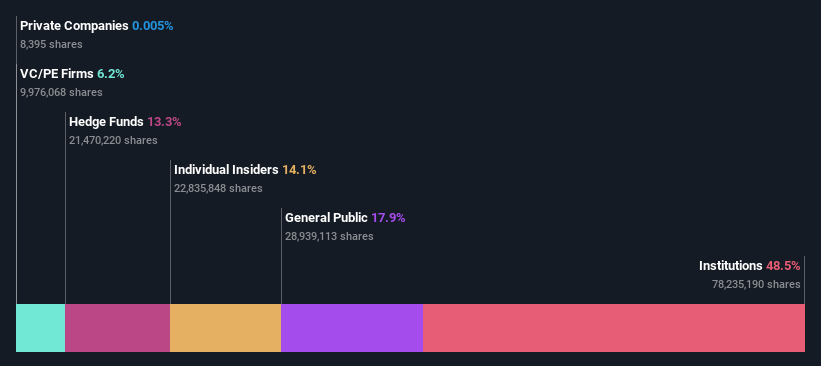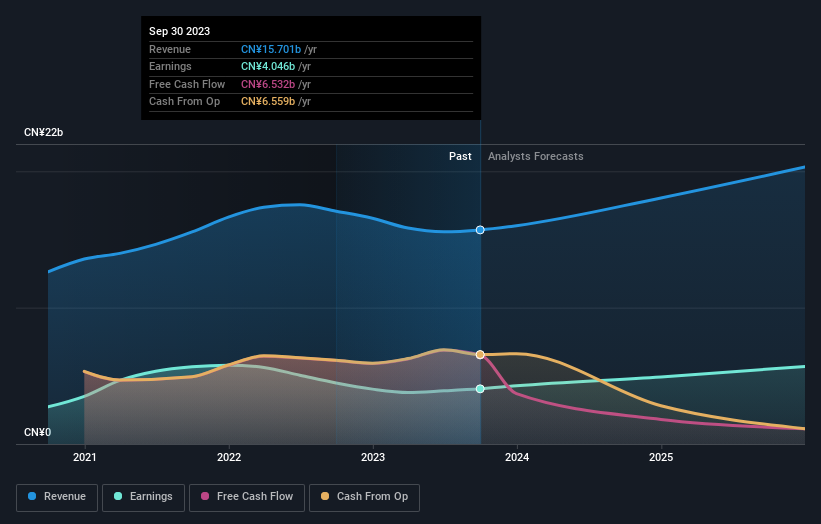Stock Analysis
- United States
- /
- Consumer Finance
- /
- NasdaqGS:QFIN
Positive week for Qifu Technology, Inc. (NASDAQ:QFIN) institutional investors who lost 32% over the past year

Key Insights
- Significantly high institutional ownership implies Qifu Technology's stock price is sensitive to their trading actions
- A total of 9 investors have a majority stake in the company with 50% ownership
- Insiders own 14% of Qifu Technology
Every investor in Qifu Technology, Inc. (NASDAQ:QFIN) should be aware of the most powerful shareholder groups. The group holding the most number of shares in the company, around 48% to be precise, is institutions. In other words, the group stands to gain the most (or lose the most) from their investment into the company.
Last week's US$74m market cap gain would probably be appreciated by institutional investors, especially after a year of 32% losses.
Let's take a closer look to see what the different types of shareholders can tell us about Qifu Technology.
View our latest analysis for Qifu Technology

What Does The Institutional Ownership Tell Us About Qifu Technology?
Institutions typically measure themselves against a benchmark when reporting to their own investors, so they often become more enthusiastic about a stock once it's included in a major index. We would expect most companies to have some institutions on the register, especially if they are growing.
As you can see, institutional investors have a fair amount of stake in Qifu Technology. This can indicate that the company has a certain degree of credibility in the investment community. However, it is best to be wary of relying on the supposed validation that comes with institutional investors. They too, get it wrong sometimes. It is not uncommon to see a big share price drop if two large institutional investors try to sell out of a stock at the same time. So it is worth checking the past earnings trajectory of Qifu Technology, (below). Of course, keep in mind that there are other factors to consider, too.

It would appear that 13% of Qifu Technology shares are controlled by hedge funds. That's interesting, because hedge funds can be quite active and activist. Many look for medium term catalysts that will drive the share price higher. Hongyi Zhou is currently the largest shareholder, with 14% of shares outstanding. In comparison, the second and third largest shareholders hold about 8.0% and 6.2% of the stock.
We did some more digging and found that 9 of the top shareholders account for roughly 50% of the register, implying that along with larger shareholders, there are a few smaller shareholders, thereby balancing out each others interests somewhat.
While it makes sense to study institutional ownership data for a company, it also makes sense to study analyst sentiments to know which way the wind is blowing. There are a reasonable number of analysts covering the stock, so it might be useful to find out their aggregate view on the future.
Insider Ownership Of Qifu Technology
The definition of company insiders can be subjective and does vary between jurisdictions. Our data reflects individual insiders, capturing board members at the very least. The company management answer to the board and the latter should represent the interests of shareholders. Notably, sometimes top-level managers are on the board themselves.
Most consider insider ownership a positive because it can indicate the board is well aligned with other shareholders. However, on some occasions too much power is concentrated within this group.
Our information suggests that insiders maintain a significant holding in Qifu Technology, Inc.. Insiders own US$325m worth of shares in the US$2.3b company. That's quite meaningful. Most would say this shows a good degree of alignment with shareholders, especially in a company of this size. You can click here to see if those insiders have been buying or selling.
General Public Ownership
The general public, who are usually individual investors, hold a 18% stake in Qifu Technology. While this size of ownership may not be enough to sway a policy decision in their favour, they can still make a collective impact on company policies.
Private Equity Ownership
Private equity firms hold a 6.2% stake in Qifu Technology. This suggests they can be influential in key policy decisions. Sometimes we see private equity stick around for the long term, but generally speaking they have a shorter investment horizon and -- as the name suggests -- don't invest in public companies much. After some time they may look to sell and redeploy capital elsewhere.
Next Steps:
While it is well worth considering the different groups that own a company, there are other factors that are even more important. Consider for instance, the ever-present spectre of investment risk. We've identified 2 warning signs with Qifu Technology , and understanding them should be part of your investment process.
If you are like me, you may want to think about whether this company will grow or shrink. Luckily, you can check this free report showing analyst forecasts for its future.
NB: Figures in this article are calculated using data from the last twelve months, which refer to the 12-month period ending on the last date of the month the financial statement is dated. This may not be consistent with full year annual report figures.
Valuation is complex, but we're helping make it simple.
Find out whether Qifu Technology is potentially over or undervalued by checking out our comprehensive analysis, which includes fair value estimates, risks and warnings, dividends, insider transactions and financial health.
View the Free AnalysisHave feedback on this article? Concerned about the content? Get in touch with us directly. Alternatively, email editorial-team (at) simplywallst.com.
This article by Simply Wall St is general in nature. We provide commentary based on historical data and analyst forecasts only using an unbiased methodology and our articles are not intended to be financial advice. It does not constitute a recommendation to buy or sell any stock, and does not take account of your objectives, or your financial situation. We aim to bring you long-term focused analysis driven by fundamental data. Note that our analysis may not factor in the latest price-sensitive company announcements or qualitative material. Simply Wall St has no position in any stocks mentioned.
About NasdaqGS:QFIN
Qifu Technology
Qifu Technology, Inc., through its subsidiaries, operates credit-tech platform under the 360 Jietiao brand in the People’s Republic of China.
Very undervalued with excellent balance sheet and pays a dividend.

